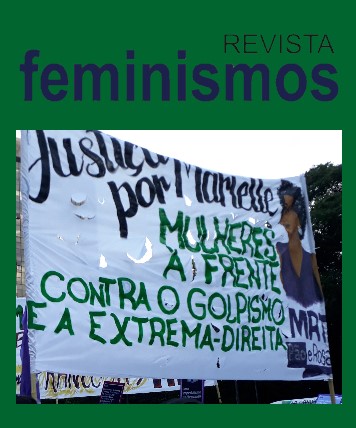POLITICAL PARTIES AND WOMEN ‘S PARTICIPATION IN POLITICS IN WEST AFRICA
DOI:
https://doi.org/10.9771/rf.v9i2.47653Palabras clave:
Political parties, political participation; patriarchy; male-style politics, genderResumen
Women in African states have contributed immensely to nation-building and socio-economic
development of their various societies. Despite, it has not translated into more women
occupying political leadership positions in West Africa. The article critically analysed the role
political parties play in preventing women from occupying political leadership positions.
Political parties in some West African states are not committed to gender equality as leadership
structure, nomination of candidates and campaign financing are biased against women. Lack
of internal democracy and male-style politics dominate party affairs which limit women
participation in politics and a confrontational approach instead of seeking collaboration and
consensus is also relevant for understanding this scenario. Patriarchy dominates the activities
of political parties thereby limiting women which further perpetuate gender inequality in
politics. It recommended that political parties should implement proportional
representation/quota system to encourage more women to contest for elective posts.
Descargas
Citas
ABBA, Sadeeque A.; BABALOLA, Dele. Contending issues in political parties in
Nigeria: The candidate selection process. Journal of Pan African Studies, v. 11, n. 1, p.
-134, 2017.
ADEBAJO, A. A., & AYODEJI, G. I.. Insecurity and women participation in the
electoral processes in Nigeria. Usukka, Nigeria: Nigerian Political Science Association
(NPSA)/University of Nigeria, 2020.
AMADIUME, I.. Gender and political systems and social movements: A West African
experience. In: MANDANI M. (ed). African Studies in Social movement and
democracy. Dakar: CODESRIA, 1994. Pp. 35-68.
BADMUS, Isiaka Alani. Poliitical Parties and Women's Political Leadership in
Nigeria: The Case. Ufahamu: A Journal of African Studies, v. 32, p. 3, 2006.
BAUER, G. (2019). Women in African parliaments: Progress and prospects. In:
YACOB-HALISO, Olajumoke; FALOLA, Toyin (Ed.). The Palgrave Handbook of
African Women's Studies. Springer International Publishing, 2019. Pp. 335-352.
CARTER Centre (2018). Presidential and parliamentary elections in Sierra Leone.
Final Report. 2018
EWOKERI, C. Why Nigeria’s women get a 50% election discount, 2018. Disponível
em: httpps://www.bbc.com/news/world-africa-45450399. Acesso em 6 jun. 2021.
EZEA, S. (2018). high cost of nominations forms, Nigerian youths and challenges of
electioneering. 2018. Disponível em: https://m.guardina.ng/saturday magazine/highcost-
of-nomination-forms, Nigerian- youths- and- challenges- of- electioneering.
Acesso em: 6 jun. 2021.
FALOLA, T.. Writing Nigeria women’s political history. In: YACOB-HALISO,
Olajumoke; FALOLA, Toyin (Ed.). The Palgrave Handbook of African Women's Studies.
CONFERENCE ON GENDER, POLITICS AND POWER: Overcoming the barriers
to the emergence of women political leaders in Nigeria by CSSR & D, Lagos.
OKOOSI-SIMBINE, A.T., & OBI, N. N. Women in political parties in Africa. In:
YACOB-HALISO, Olajumoke; FALOLA, Toyin (Ed.). The Palgrave Handbook of
African Women's Studies. Springer International Publishing, 2019. Pp. 315-334.
OMENMA, J. Tochukwu; ONU, J. Chisolum; OMENMA, Z. Onyinyechi. Factors
Limiting Nomination of Women Candidates for Elections in Nigeria. Mediterranean
Journal of Social Sciences, v. 7, n. 5, p. 202, 2016
ONI, S, & JOSHUA, S. Gender Relations in Nigeria’s Democratic Governance. Journals
of Politics & Governance, v.1.n.2/3 p.4.2012
POGOSON, A. I. Women, political parties and exclusion in Nigeria: 1999-
Political Parties and Democracy in Nigeria, Kuru: NIPSS, 2014. Pp. 237-264.
QUAYE, M. Ghana: Quest for increased female mps - quaye advocates affirmative
action. Disponível em: http/www.peacewomen.org/content>ghana-quest-increasedfemale-
mps-quaye-advocates-affirmative-action.
RAMTOHUL, R.. Women, gender and politics in Africa. In: YACOB-HALISO,
Olajumoke; FALOLA, Toyin (Ed.). The Palgrave Handbook of African Women's
Studies. Springer International Publishing, 2019. Pp. 297-313.
ROGERS, Maseray Ngadie. Women, politics and decision-making in Sierra
Leone. Ghana Journal of Development Studies, v. 8, n. 1, p. 50-71, 2011.
TAWIAH, E.. Can women achieve equal political representation in Ghana? Gender
Centre for Empowering Development. 2018.
TENU, C.. Obstacles to gender parity in political representation: The case of Ghanaian
parliament. Dissertação de mestrado. Department of Political Science, Memorial
University of Newfoundland. 2019.
TRIPP, Aili Marie. Women and politics in Africa. In: NGOM, Fallou. Oxford Research
Encyclopedia of African History. Oxford: Oxford University Press, 2017. Pp. 1-29.
TSIKATA, Dzodzi. Affirmative action and the prospects for gender equality in
Ghanaian politics. Accra: FES, 2009. Disponível em:
https://www.semanticscholar.org. Acesso em: 6 jun. 2021.
Descargas
Publicado
Cómo citar
Número
Sección
Licencia
Autoras/es que publicam nesta revista concordam com os seguintes termos:
1. Autoras/es mantém os direitos autorais e concedem à revista o direito de primeira publicação, com o trabalho simultaneamente licenciado sob a Creative Commons Attribution License que permitindo o compartilhamento do trabalho com reconhecimento da autoria do trabalho e publicação inicial nesta revista.
2. Autoras/es têm autorização para assumir contratos adicionais separadamente, para distribuição não-exclusiva da versão do trabalho publicada nesta revista (ex.: em repositório institucional ou como capítulo de livro), com reconhecimento de autoria e publicação inicial nesta revista.
3. Autoras/es têm permissão e são estimuladas/os a publicar e distribuir seu trabalho online (ex.: em repositórios institucionais ou na sua página pessoal) a qualquer ponto antes ou durante o processo editorial, já que isso pode gerar alterações produtivas, bem como aumentar o impacto e a citação do trabalho publicado.

